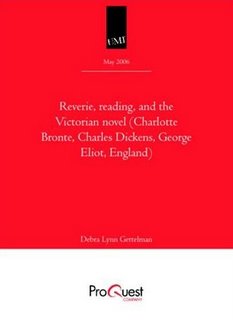 ProQuest Information and Learning
ProQuest Information and Learning continues publishing thesis and dissertations. One of the last ones is this one by Debra Gettelman (Ph.D. for the Harvard University and now Assistant Professor in the
College of the Holy Cross, Worcester, MA)
Reverie, reading, and the Victorian novel (Charlotte Brontë, Charles Dickens, George Eliot, England) -- Dissertation (Paperback)
by Debra Gettelman
This dissertation argues that nineteenth-century British fiction was profoundly shaped by its rapport with contemporary theories of the reader's imagination. Since the eighteenth century, the activity of the novel reader's mind had been likened pejoratively to one kind of imagining: daydreaming. Critics had invoked female readers' 'reveries of fiction' to dismiss the unwanted creativity which novel reading stirred, while physicians and philosophers pathologized reverie as a dangerous mental state. Yet with the rise of psychology as a scientific discipline in the mid-nineteenth century---through the work of Alexander Bain, Herbert Spencer, and William Carpenter---reveries became legitimated as capsules in which the normative, not pathologized, state of consciousness could be observed. Rather than a satiric way of describing novel readers' minds, daydreams proved an actual component of reading. While the Romantic and Modernist periods have long been associated with the interiority and narrative forms characteristic of private reverie, its presence in Victorian fiction has gone nearly unexamined. Neither have studies of Victorian culture yet recognized the reader's imaginative habits as a tangible part of nineteenth-century reading history. The dissertation argues that this new appraisal of the reader's imagination redefined not only the reception, but the production of Victorian fiction. Charlotte Brontë, George Eliot, Charles Dickens, and Mary Elizabeth Braddon were each engaged with psychological theories circulating in the broader culture. Readerly imagining---whether rapt absorption, distracted inattention, eager prediction, or wandering consciousness---is represented and reflected upon within their fiction itself, as both a narrative resource and a disciplinary nuisance. For within Victorian novels, readers are invited to daydream while reading, to fill in the most personal and unnarratable affect of a story, while at the same time being cautioned, through the model of the characters' reveries, against undisciplined imagining that can prove more absorbing than the text itself. Through readings of Jane Eyre, Little Dorrit, Adam Bede, and The Doctor's Wife, the dissertation argues that the reader's imagination was both a supplement and a provocation that shaped Victorian fiction, as its authors confronted the fertile, if slippery, resource of their readers' minds.
Product Details
* Paperback: 252 pages
* Publisher: ProQuest / UMI (October 19, 2006)
* Language: English
* ISBN: 0542391767
Categories: Books, Jane Eyre, Scholar









0 comments:
Post a Comment